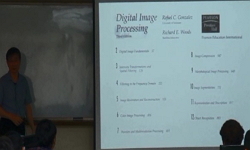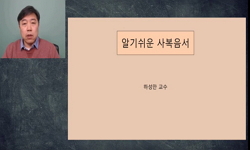It has been the subject of much debate among N.T. scholars whether Jews of the first century A.D. believed that they still remained in the exile, though their ancestors had already returned from Babylon centuries ago. The present article attempts to a...
http://chineseinput.net/에서 pinyin(병음)방식으로 중국어를 변환할 수 있습니다.
변환된 중국어를 복사하여 사용하시면 됩니다.
- 中文 을 입력하시려면 zhongwen을 입력하시고 space를누르시면됩니다.
- 北京 을 입력하시려면 beijing을 입력하시고 space를 누르시면 됩니다.

A Political Implication of ‘from the Babylonian Exile to the Christ’ (Mt 1:17) to the Postwar Jewish Readers
한글로보기https://www.riss.kr/link?id=A105947782
-
저자
김태섭 (장로회신학대학교)
- 발행기관
- 학술지명
- 권호사항
-
발행연도
2018
-
작성언어
English
-
주제어
Matthew ; genealogy ; Babylonian exile ; restoration ; fall of Jerusalem ; 마태복음 ; 예수의 족보 ; 바벨론 포로시대 ; 이스라엘의 회복 ; 예루살렘 멸망
-
등재정보
KCI등재
-
자료형태
학술저널
-
수록면
31-54(24쪽)
-
KCI 피인용횟수
0
- DOI식별코드
- 제공처
-
0
상세조회 -
0
다운로드
부가정보
다국어 초록 (Multilingual Abstract)
According to the Gospel of Matthew, Israel is the people (lao,j) in need of salvation from ‘sins’ (Mt 1:21) and the ‘lost sheep without a shepherd’ (10:6 cf. 15:24). Despite the return from Babylon centuries ago, Israel’s current predicament is no better than the time of the exile.
Yet, Matthew’s genealogy articulates that the Babylonian exile has its terminus in Jesus. This good news resonates, not least with the Jewish readers who have recently undergone the fall of Jerusalem. To them, Babylon reads like an epithet for Rome. Although Israel is now under the yoke of the symbolic Babylon, they can still hope that it will be reversed by Jesus, the Christ.
It has been the subject of much debate among N.T. scholars whether Jews of the first century A.D. believed that they still remained in the exile, though their ancestors had already returned from Babylon centuries ago. The present article attempts to address this issue in the study of Matthew, arguing from authorial reader’s viewpoint that the exile was not deemed over to the Jewish readers of post 70’s who readily thought of Babylon as an epithet for Rome.
According to the Gospel of Matthew, Israel is the people (lao,j) in need of salvation from ‘sins’ (Mt 1:21) and the ‘lost sheep without a shepherd’ (10:6 cf. 15:24). Despite the return from Babylon centuries ago, Israel’s current predicament is no better than the time of the exile.
Yet, Matthew’s genealogy articulates that the Babylonian exile has its terminus in Jesus. This good news resonates, not least with the Jewish readers who have recently undergone the fall of Jerusalem. To them, Babylon reads like an epithet for Rome. Although Israel is now under the yoke of the symbolic Babylon, they can still hope that it will be reversed by Jesus, the Christ.
참고문헌 (Reference)
1 Hagner, Donald A., "Treasures New and Old:Contributions to Matthean Studies" Scholars Press 27-68, 1996
2 Hare, Douglas R. A., "The Theme of Jewish Persecution of Christian in the Gospel according to St. Matthew" Cambridge University Press 1967
3 Davies, W. D, "The Setting of the Sermon on the Mount" Scholars Press 1989
4 Goodman, M, "The Ruling Class of Judaea" Cambridge University Press 1987
5 Kilpatrick, G. D., "The Origins of the Gospel according to St. Matthew" Clarendon Press 1950
6 Wright, N. T., "The New Testament and the People of God: Christian Origins and the Question of God" Fortress 1992
7 Chancey, Mark A, "The Myth of a Gentile Galilee" Cambridge University Press 2002
8 Beare, F. W., "The Mission of the Disciples and the Mission Charge: Matthew 10 and Parallels" 89 (89): 1-13, 1970
9 Garland, David E, "The Intention of Matthew 23" E. J. Brill 1979
10 Massaux, Edouard, "The Influence of the Gospel of Saint Matthew on Christian Literature before Saint Irenaeus" Mercer University Press 1990
1 Hagner, Donald A., "Treasures New and Old:Contributions to Matthean Studies" Scholars Press 27-68, 1996
2 Hare, Douglas R. A., "The Theme of Jewish Persecution of Christian in the Gospel according to St. Matthew" Cambridge University Press 1967
3 Davies, W. D, "The Setting of the Sermon on the Mount" Scholars Press 1989
4 Goodman, M, "The Ruling Class of Judaea" Cambridge University Press 1987
5 Kilpatrick, G. D., "The Origins of the Gospel according to St. Matthew" Clarendon Press 1950
6 Wright, N. T., "The New Testament and the People of God: Christian Origins and the Question of God" Fortress 1992
7 Chancey, Mark A, "The Myth of a Gentile Galilee" Cambridge University Press 2002
8 Beare, F. W., "The Mission of the Disciples and the Mission Charge: Matthew 10 and Parallels" 89 (89): 1-13, 1970
9 Garland, David E, "The Intention of Matthew 23" E. J. Brill 1979
10 Massaux, Edouard, "The Influence of the Gospel of Saint Matthew on Christian Literature before Saint Irenaeus" Mercer University Press 1990
11 Harrington, Daniel J, "The Gospel of Matthew" The Liturgical Press 1991
12 France, R. T., "The Gospel of Matthew" William B. Eerdmans 2007
13 Crossley, James G, "The Date of Mark’s Gospel : Insight from the Law in Earliest Christianity" T&T Clark 2004
14 Cousland, J. R. C, "The Crowds in the Gospel of Matthew" Brill 2002
15 Horsely, Richard A, "The Bible and the Dead Sea Scrolls Volume 2: The Dead Sea Scrolls and the Qumran Community" Baylor University Press 37-60, 2006
16 White, L. M., "Social History of the Matthean Community: Cross-disciplinary Approaches" Fortress Press 211-247, 1991
17 Goodman, M., "Rome and Jerusalem : The Clash of Ancient Civilizations" Penguin 2007
18 Aune, David E., "Revelation 17-22" Word Books 1998
19 Farmer, William R., "Rethinking the Synoptic Problem" Baker Academic 97-135, 2001
20 Wilson, S. G., "Related Strangers: Jews and Christians, 70-170 C.E" Fortress Press 1995
21 Evans, Craig A., "Predictions of the Destruction of the Herodian Temple in the Pseudepigrapha Qumran Scrolls, and Related Texts" 10 : 89-147, 1992
22 Smith, M. W., "Playing a Double Game: Authorial Reading and the Ethics of Interpretation" 1 (1): 9-19, 2005
23 Olmstead, Wesley G., "Matthew’s Trilogy of Parables: The Nation, the Nations and the Reader in Matthew 21.28-22.14" Cambridge University Press 2003
24 Weaver, Dorothy J., "Matthew’s Missionary Discourse: A Literary Critical Analysis" JSOT Press 1990
25 Howell, David B, "Matthew’s Inclusive Story : A Study in the Narrative Rhetoric of the First Gospel" JSOT Press 1990
26 Overman, J. A., "Matthew’s Gospel and Formative Judaism : The Social World of the Matthean Community" Fortress Press 1990
27 Gundry, R. H, "Matthew : A Commentary on His Handbook for a Mixed Church under Persecution" Eerdmans 1994
28 Luz, Ulich, "Matthew 8-20" Fortress Press 2001
29 Luz, Ulich, "Matthew 21-28" Fortress Press 2005
30 Luz, Ulich, "Matthew 1-7" Fortress Press 2007
31 Hagner, Donald A, "Matthew 1-13" Word Books 1993
32 Blomberg, Craig, "Matthew" Broadman Press 1992
33 Hare, Douglas R. A, "Matthew" John Knox Press 1993
34 Head, I. F., "Mark as a Roman Document from the Year 69: Testing Martin Hengel’s Thesis" 28 (28): 240-259, 2004
35 Collins, Adela Y, "Mark : A Commentary" Fortress Press 2007
36 Evans, Craig A., "Jesus and the Dead Sea Scrolls" Doubleday 235-253, 1992
37 Konradt, Matthias, "Israel, Kirche und die Völker im Matthäusevangelium" Mohr Siebeck 2007
38 Nolland, John, "Gospel of Matthew : A Commentary on the Greek Text" William B. Eerdmans 2005
39 Scott, James M., "Exile: A Conversation with N. T. Wright" IVP 2017
40 Carter, Warren, "Evoking Isaiah: Matthean Soteriology and an Intertextual Reading of Isaiah 7-9 and Matthew 1:23 and 4:15-16" 119 (119): 503-520, 2000
41 Kloppenborg, John, "Evocatio Deorum and the Date of Mark" 124 (124): 419-450, 2005
42 Goldenberg, Robert, "Early Rabbinic Explanations of the Destruction of Jerusalem" 33 : 517-525, 1982
43 Döpp, Heinz-Martin, "Die Deutung der Zerstörung Jerusalems und des Zweiten Tempels im Jahre 70 in den ersten Jahrhunderten n.Chr" Francke Verlag 1998
44 Hümmel, R, "Die Auseinandersetzung zwischen Kirche und Judentum im Matthäusevangelium" Chr. Kaiser 1966
45 Schottroff, Luise, "Das Gleichnis vom großen Gastmahl in der Logienquelle" 47 (47): 192-211, 1987
46 Overman, J. A., "Church and Community in Crisis: The Gospel according to Matthew" Trinity Press International 1996
47 Reed, Annette Yoshiko, "Changing Face of Judaism, Christianity, and other Greco-Roman Religions in Antiquity" Gütersloher Verlagshaus 324-348, 2006
48 Schaper, Joachim, "Cambridge History of Judaism Vol. 3" Cambridge University Press 402-427, 1999
49 Neusner, Jacob, "Aufstieg und Niedergang der Römischen Welt Band II.19.2: Religion (Judentum:Allgemeines, Palästinisches Judentum)" Walter de Gruyter 3-42, 1979
50 Marguerat, D., "Ancient and Modern Scriptural Historiography" Peters 311-331, 2007
51 Davies, W. D., "A Critical and Exegetical Commentary on the Gospel according to Saint Matthew Vol. 3" T. & T. Clark 1997
52 Davies, W. D., "A Critical and Exegetical Commentary on the Gospel according to Saint Matthew Vol. 2" T. & T. Clark 1991
53 Davies, W. D., "A Critical and Exegetical Commentary on the Gospel according to Saint Matthew Vol. 1" T. & T. Clark 1988
동일학술지(권/호) 다른 논문
-
Kriterienkatalog-Prototyp zur Lehrwerkanalyse sowie–auswahl
- 장로회신학대학교 기독교사상과문화연구원
- 권영숙
- 2018
- KCI등재
-
“The Lord was Sorry that He had Made Man”: Augustine, Luther, and Calvin on Genesis 6-8
- 장로회신학대학교 기독교사상과문화연구원
- 송인서
- 2018
- KCI등재
-
- 장로회신학대학교 기독교사상과문화연구원
- 오동일
- 2018
- KCI등재
-
- 장로회신학대학교 기독교사상과문화연구원
- 김동성
- 2018
- KCI등재
분석정보
인용정보 인용지수 설명보기
학술지 이력
| 연월일 | 이력구분 | 이력상세 | 등재구분 |
|---|---|---|---|
| 2022 | 평가예정 | 재인증평가 신청대상 (재인증) | |
| 2019-01-01 | 평가 | 등재학술지 유지 (계속평가) |  |
| 2016-01-01 | 평가 | 등재학술지 유지 (계속평가) |  |
| 2012-01-01 | 평가 | 등재학술지 선정 (등재후보2차) |  |
| 2011-10-06 | 학술지명변경 | 외국어명 : Journal of Presbyterian College and Theological Seminary -> Korea Presbyterian Journal of Theology |  |
| 2011-01-01 | 평가 | 등재후보 1차 PASS (등재후보1차) |  |
| 2010-11-22 | 학회명변경 | 한글명 : 통합신학연구원 -> 기독교사상과문화연구원영문명 : 미등록 -> Center for Studies of Christian Thoughts and Culture |  |
| 2009-01-01 | 평가 | 등재후보학술지 선정 (신규평가) |  |
학술지 인용정보
| 기준연도 | WOS-KCI 통합IF(2년) | KCIF(2년) | KCIF(3년) |
|---|---|---|---|
| 2016 | 0.69 | 0.69 | 0.64 |
| KCIF(4년) | KCIF(5년) | 중심성지수(3년) | 즉시성지수 |
| 0.66 | 0.58 | 0.855 | 0.18 |




 KCI
KCI



